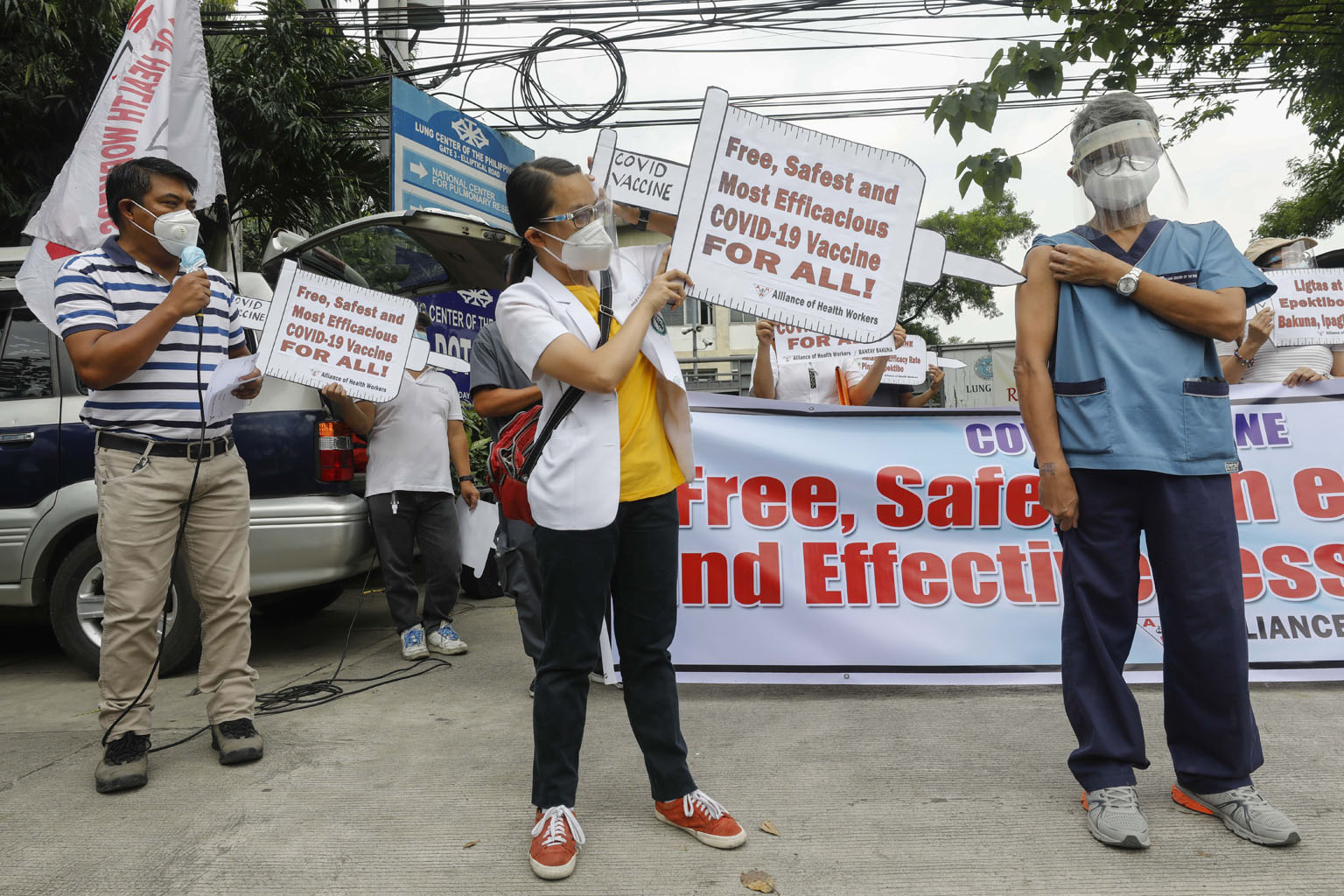Coronavirus Vaccines
Philippines rolls out Covid-19 vaccination amid challenges
Govt yet to close supply deals to lock in dates for more doses, and faces low support for inoculation
Sign up now: Get insights on Asia's fast-moving developments

Protesters calling for free and safe Covid-19 vaccines at a rally outside the Lung Centre of the Philippines in Quezon City, Metro Manila, yesterday. An opinion poll showed that fewer than a third of Filipinos are willing to be vaccinated, mostly because of perceptions of potential side-effects. China's vaccines, in particular, are being met with scepticism.
PHOTO: EPA-EFE
The Philippines began the biggest and most crucial inoculation drive in its history yesterday, seeking to push back a pandemic that has so far claimed the lives of more than 12,000 Filipinos.
Dr Gerardo Legaspi, head of the country's largest public hospital, received the first of over 600,000 doses of a vaccine China's Sinovac flew to the Philippines on Sunday.
The government's top ministers, including "vaccine czar" Carlito Galvez, and staff at six hospitals in Metro Manila afterwards lined up to get their own shots.
"Let's not wait for the best vaccine. There's no such thing. The best vaccine is the one that's safe and effective - and arrives early," Mr Galvez said at a news briefing after he received his jab.
While it has South-east Asia's second-biggest Covid-19 outbreak at more than half a million infections, the Philippines is the last nation in the region to begin an inoculation programme against Covid-19. This has fuelled concerns over recovery prospects for a consumption-driven economy that suffered its worst slump on record last year, hit by lengthy coronavirus lockdowns.
The government is seeking to overcome supply woes and a lack of support for its vaccination programme.
The Philippines has secured pledges from at least five vaccine makers guaranteeing some 148 million doses for at least 70 million Filipinos. But it has yet to close supply deals to lock in dates for when these will arrive. The shipment supposedly last month of over 600,000 doses from Pfizer-BioNTech and AstraZeneca was delayed by documentation snafus.
Mr Galvez said he expects Sinovac to ship a million more doses this month.
The Philippines is also hoping to receive delivery of over three million jabs from AstraZeneca in the first quarter, he added.
But the bulk of the vaccines would arrive in the latter part of the year: some 26 million in the second quarter, and roughly 100 million in the second half.
An opinion poll showed that fewer than a third of Filipinos are willing to be vaccinated, mostly because of perceptions of potential side effects. China's vaccines, in particular, are being met with scepticism here due to concerns over their efficacy rates.
The hesitancy is not surprising, as public trust in the government's inoculation drive has yet to recover from a controversy four years ago involving another vaccine.
The Philippines was the first country in 2016 to deploy the dengue vaccine Dengvaxia, but a botched roll-out led to unfounded claims that several dozen children had died from the jab.
The coronavirus vaccine roll-out comes as experts warn of a "serious increase" in Covid-19 infections in Metro Manila, home to some 13 million and the country's pandemic epicentre.
The University of the Philippines-based Octa Research Group said the capital region had been seeing 900 cases a day.
"The last time we were getting 900 cases per day was in October," said Octa research fellow Guido David.
Unless this trend is checked, he said, Metro Manila could see infections rise to at least 2,500 a day, the level in August when the country's public health system was being overwhelmed by a surge in Covid-19 patients.


